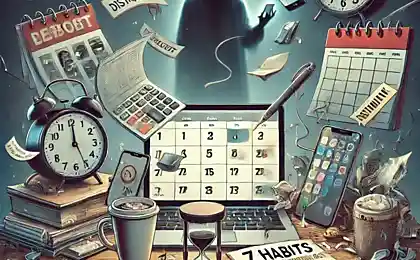470
5 effective tricks that allow you to carry more things

In this article we will tell you how to become productive ninjas, paying less attention to time management and more on managing your energy.
1) Know when you are in the best shape and plan accordingly. Charlie Munger, VP of Berkshire Hathaway, used a similar system for continuous improvement.
He determined the best time for yourself and then constantly spending one of these hours for training.
Charlie Munger found one strategy when I was a young lawyer. He made a decision: every time legal work will be not as intellectually stimulating as I would like, "I'm going to sell the best hour of the day to yourself". He was going to use otherwise billable time at the peak of the day and devote his own reflection and learning. "And only after improving my mind, after I spend the most productive hours for me, and I'm going to sell their customers".
Are you a morning lark? Night owl? Tired after lunch? Feel better after a short NAP? Find out what works for you, and use it in their plans.
2) Sleep enough time. No, you will not be able to deceive themselves in regard to sleep.Tricks with an afternoon lead to a whole cascade of negative consequences, of which the smallest is the reduction of Pro-activity.
Regardless of how well you managed to spend the day after a sleepless night, you are unlikely to feel the most cheerful and happy for the world. Your more negative than usual look at all was the result of a General deterioration in mood, which is a normal consequence of overwork. And that is more important than sentiment: this state of mind is often accompanied by decreased ability to think and act proactively, control impulses, positive attitude to themselves, to empathize with others, and use of emotional perception.
Really, people, emotions of which after a sleepless night so unstable, can be attributed to psychopaths.
The combination of these things changes the results obtained by a clinical rating scale of mood disorders, often turning perfectly normal people in the border zone of adequacy. Therefore, when testing in this specific day, some of them were classified as being in a state of depression, or even as psychopaths.
3) Distraction dullsSchool in new haven was located near a noisy railway line. Measuring the impact of these sounds on academic performance, a couple of researchers noted that only one side of the building faces on the way. Students in classes this half is constantly exposed to noise, but otherwise completely like their comrades. Scientists found a striking difference between the two sides of the school. The pupils of sixth class in half, facing the trains, the whole year behind their peers with quiet side. The following information appeared when attracted by the study of the townspeople mounted sound-absorbing shields. The researchers found that it smoothed differences: now the productivity of students on both sides of the building equal.
Distraction can cause you will not notice the passing of gorillas. Seriously.
4) Work where you normally perform tasksKnow where you productive? Go there. How about the place where you will always find Raven and lose time? Avoid it.
USC Professor Wendy wood explains how the environment develops habits — so much so that your mind doesn't even notice.
Habits are the result of gradual study of the relations between action and outcome associated with circumstances. After the formation of habits, the various elements of the environment can become a stimulus that triggers the behavior independently of intentions and the lack of a specific purpose... Very often the mind that even does not catch.
Circumstances matter more than you think.
5) Believe in what you're doing. Sounds like an old-fashioned cliché, but research confirms it.
What happens if you perceive their tasks as a challenge rather than just work to feed themselves? You are more careful, interested and happy.
Research psychologists AMI Wrzesniewski and Jane Dutton shows just how much our installations is what we have decided to focus — affect our work. Wrzesniewski and Dutton followed a group of cleaners at the hospital and found that some of them perceived their activities as a work — something performed only for payment — and described her as boring and pointless. But another group perceived the same tasks as a challenge and believed held in the hospital hours of exciting and significant. The second group of cleaners carried out their duties differently than the first. They are more likely to engage with nurses, patients and visitors, wanting to improve the status of each of those with whom in contact. Generally, they saw their work in a wider context: not only removed the chamber and threw garbage, but also contributed to the rehabilitation of patients and soothing atmosphere of the hospital.
How to do it? This is due to the interaction with people who benefit from your work.
A Professor from Wharton, Adam Grant, conducted a study, trying to increase the motivation of employees of the University call center.
When call-center workers were shown letters from grateful students who have received a scholarship through conversations with them, their motivation increases dramatically.
And that could raise it even higher? The conversation with these students.
When employees personally met with one of the scholarship recipients, have intensified. The average worker has doubled the number of calls per hour and minutes on a wire a week. Acting more diligently, the staff helped a greater number of graduates, bringing the number of weekly fellows to 144%. Even more impressive is that the income of the workers increased 5-fold, from $ 412 before meeting the scholarship recipient to more than $ 2,000 after her.
Never underestimate the power of the right approach. published
P. S. And remember, just changing your mind — together we change the world! ©
Source: megamozg.ru/company/mbaconsult/blog/16068/























